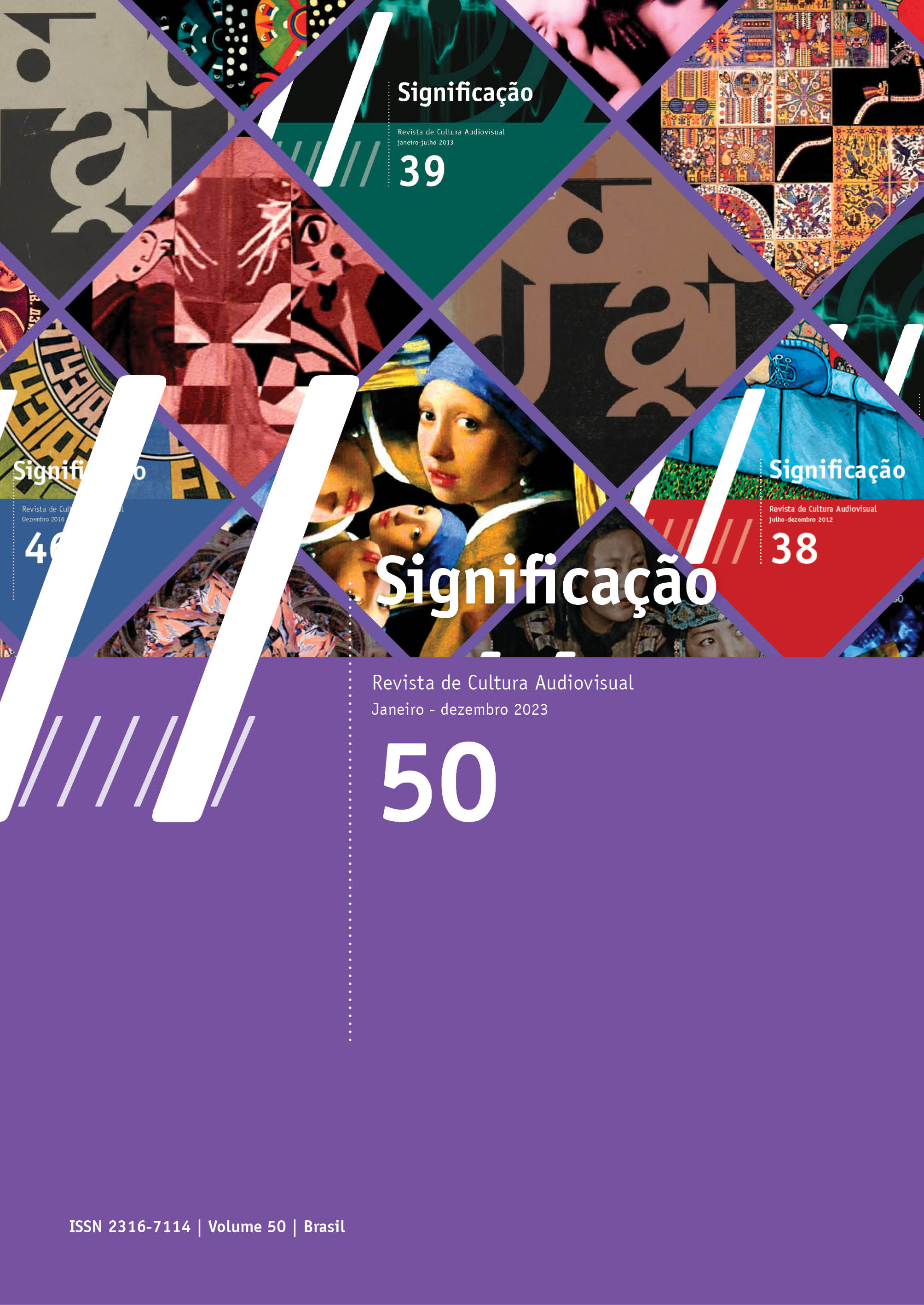Two by Two, four:temporality, performance,and film essay inThe dreamed ones film
DOI:
https://doi.org/10.11606/issn.2316-7114.sig.2023.194124Keywords:
Letters exchange, Trauma, Presence, Performance, Temporality, Essay filmAbstract
In this article, I aim to analyze the film essay Die Geträumten (The dreamed ones, 2016), by Ruth Beckermann, and the letter exchange between Paul Celan and Ingeborg Bachman, Heart’s time. First of all, I present some questions on the letter exchange between Celan and Bachmann, then I associate the characteristic of the film essay with the theme of performance and time. Finally, I will develop the issue of temporality, associating it to the discussion of the main characters in the plot as a choice to escape the theoretical references of trauma for Literature, Cinema, and History.
Downloads
References
ALTER, N. M. The Essay Film after Fact and Fiction. New York: Columbia University Press, 2018.
BERNHARDT, T. A Extinção. Tradução: José Marcos Mariani de Macedo. São Paulo: Companhia das Letras, 2000.
BACHMANN, I.; CELAN, P.; BADIOU, B.; HÖLLER, H.; STOLL, A.; WIEDERMANN, B. (ed.). Herzzeit: Ingeborg Bachmann – Paul Celan Der Briefwechsel. Mit den Briefwechseln zwischen Paul Celan und Max Frisch sowie zwischen Ingeborg Bachmann und Gisèle Celan-Lestrange. Frankfurt am Main: Suhrkamp Verlag, 2008.
BACHMANN, I. O tempo adiado e outros poemas. Seleção, tradução e posfácio: Claudia Cavalcanti. São Paulo: Todavia, 2020.
CANETTI, E. O outro processo. As cartas de Kafka a Felice. Tradução: Herbert Caro. Rio de Janeiro: Espaço e Tempo, 1988.
FOSTER, H. “An archival impulse”. October, Cambridge, v. 110, p. 3-22, 2004.
FOSTER, H. O retorno do real. Tradução: Célia Euvaldo. São Paulo: Cosac &
Naify, 2014.
GUMBRECHT, H. U. Produção de presença: o que o sentido não consegue transmitir. Rio de Janeiro: Contraponto; Editora PUC-Rio, 2010.
GUMBRECHT, H. U. Atmosfera, ambiência, stimmung: sobre um potencial oculto da literatura. Rio de Janeiro: Contraponto; Editora PUC-Rio, 2014.
HUTCHEON, L. Uma teoria da adaptação. Tradução: André Cechinel. Florianópolis: Editora da UFSC, 2013.
KERMODE, F.; KERMODE, A. The Oxford book of letters. Oxford: Oxford University Press, 1995.
LACAPRA, D. History and its limits. Human, animal, violence. Ithaca: Cornell University Press, 2009.
LUDMER, J. Aqui América Latina: uma especulação. Buenos Aires: Eterna Cadencia, 2010.
MAEDING, L. “Gespräch und Schweigen. Zum Ort der Dichtung im Briefwechsel” WIMMER, Gernot (Hrsg.). Ingeborg Bachmann und Paul Celan. Historischpoetische Korrelationen. Untersuchungen zur deutschen Literaturgeschichte. Berlin; Bosto: Walter de Gruyter, 2014.
WEIGEL, Sigrid. Traurig verliebt: Ingeborg Bachmann und Paul Celan. Sigrid Weigel im Gespräch mit Sigrid Brinkmann. Berlin: Deutschlandfunk Kultur, 26 set. 2016. Disponível em: https://www.deutschlandfunkkultur.de/ Acesso em: 26 maio 2021.
STAM, R. A Literatura através do cinema. Realismo, magia e arte da adaptação. Tradução: Marie-Anne Kremer e Gláucia Renate Gonçalves. Belo Horizonte: Editora UFMG, 2008.
ZUMTHOR, P. Performance, recepção, leitura. Tradução: Jerusa Pires Ferreira e Suely Fenerich. São Paulo: Cosac Naify, 2014.
Referências audiovisuais
DIE Geträumten (Os Sonhados). Ruth Beckermann, Áustria, 2016.
LIGHTNING over water (Um Filme para Nick). Wim Wenders, Suécia, 1980
SHOAH. Claude Lanzmann, França, 1985.
Downloads
Published
Issue
Section
License
Copyright (c) 2023 Eduardo Ferraz Felippe

This work is licensed under a Creative Commons Attribution-NonCommercial 4.0 International License.
Authors who publish in this journal must agree with the following terms:
- Authors keep their copyrights and grant the journal first time publication rights, having their articles simultaneously licensed under the Creative Commons Attribution License, which allows sharing texts with authorship recognition and first publication on this journal for non-commercial purposes.
- Authors are allowed to make additional contracts, for a non-exclusive distribution of the article’s version published on this journal (e.g.: publishing in institutional repositories of articles or as a book chapter), with authorship recognition and first publication on this journal.
















